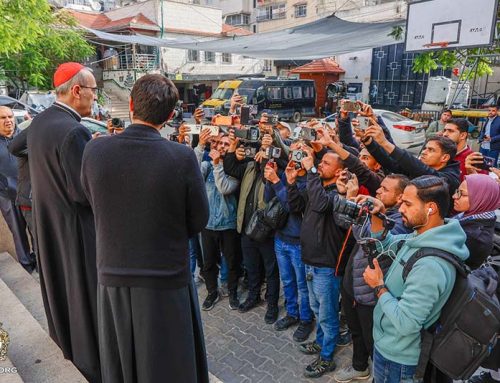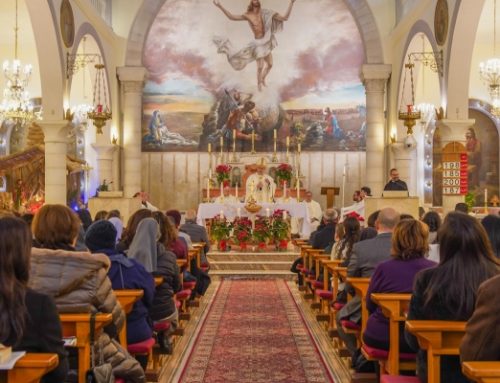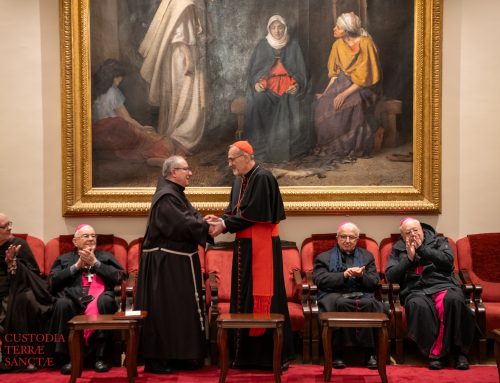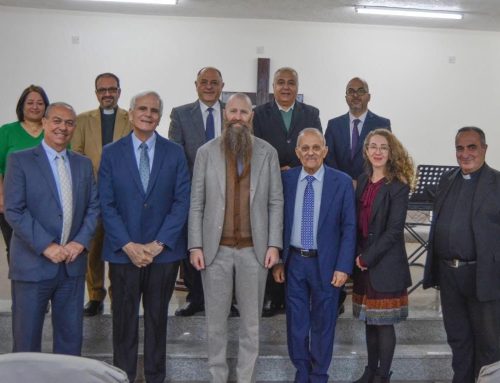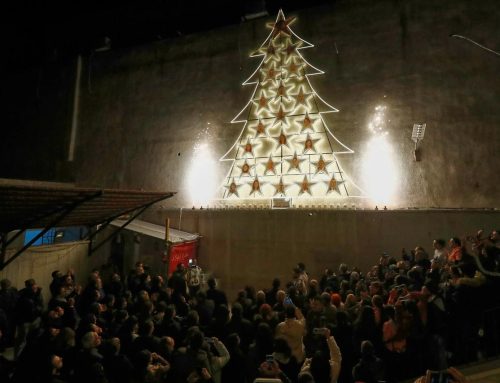On Saturday, June 24, 2023, the Catholic Center for Studies and Media (CCSM) in Jordan held a conference in cooperation with Konard Adenauer Stiftung (KAT) titled, “Political Participation in Jordan from a Religious Perspective.”
The conference, held under the patronage of His Excellency Abdul-Raouf Rawabdeh, was attended by Apostolic Nuncio to Jordan Archbishop Giovanni Pietro Dal Toso, Muslim and Christians clergymen, journalists, and notables.
During the conference sessions, the conferees stressed that religion– although it does not participate in political activities–serves as a supportive and encouraging factor to political participation by calling upon its believers and followers not to be on the margins of society and its reform paths, but rather be in its heart as well as on its path and thinking.
Furthermore, the conferees stressed that the political reform conveyed by His Majesty King Abdullah II designed to form a committee entrusted with formulating recommendations that map out the bright Jordanian future necessitates that the citizens be alerted to the need to get into this reform procession that paves the way for a stronger, sublime, and more democratic Jordan that involves the participation of all its citizens..
In an opening address, CCSM Director Fr. Dr. Rif’at Bader welcomed the participants in the conference noting that since the establishment of the CCSM in 2012, it has taken upon itself–being active under the umbrella of the Latin Patriarchate and in cooperation with various churches, religions, and the extended components of the Jordanian society–conveying a positive voice calling for equality in rights and duties, for good citizenship, and for looking at every citizen as not being a spectator, but rather be at the heart of societal life, including the religious, social, cultural and political aspects.
He pointed out that the Jordanian state does not want to confuse religious affairs with political affairs, as there are effectively religious and political authorities, as well as there is neither interaction between them nor the one replacing the other, as there is rather sharing and cooperation for the good of the extended society. He referred to the discussion papers of His Majesty King Abdullah II noting that they draw up the features of our new Jordan which requires ensuring the awareness of its people and their desire to perform services, cooperation and participation.
Concluding his address, Fr. Bader cited the “Beatitudes of the Politician” proposed by Vietnamese Cardinal François-Xavier Thuan, who passed away in 2002 which lists the values that a politician must abide by.
For his part, Resident Representative of Konard Adenauer Stiftung in Jordan Dr. Edmund Ratka said that there is a rise of populism in Europe and a loss of confidence in political systems around the world, noting that it is time for every country to map out its own way in politics.
Adding that a broader political participation leads to better governance and long-term stability in countries, he said that Christianity and Islam encourage people to work for a better world down here on Earth since political engagement is a daily process. He, furthermore, stated that religious communities can activate citizenship and need for people becoming political leaders.
Then, the CCSM presented a short film on political reforms, particularly with regards to the establishment of political parties and election laws.
The conference included three discussion panels. The first one was titled, “Religion and Political Participation in Jordan” moderated by journalist Shahed Al Tarawneh. It was addressed by Professor at the Faculty of Shari’a at Al al-Bayt University Dr. Amer Al-Hafi on “Political Participation from a Muslim Perspective”; General Secretary of the Latin Vicariate in Amman Fr. Dr. Imad Alamat on “Political Participation from a Christian Perspective”; Secretary General of the Council of Churches in Jordan Fr. Ibrahim Dabbour on”The Position of the Church in Support of Political, and Media Participation Specialized in Electoral and Parliamentary Politics”: and journalist Rana Al Khamayseh on “The Need to Participate in Political Life.”
In an intervention by Fr. Ibrahim Dabbour, he emphasized that the Church’s teachings encourage political participation while viewing that its ultimately aim is to serve humans and enhance their dignity, which consequently emphasizes the important role of Christians in building prosperous homelands through good citizenship.
The second discussion panel was titled, “Making Political Life More Inclusive” and moderated by Head of Programs at Caritas Jordan Omar Abawi. The panelists included Dean of Student Affairs at the German-Jordanian University Dr. Thelal Oweis on “The Role of Youth in Political Life”; Professor of Journalism at Yarmouk University Dr. Marcel Jweinat on “The Role of Women in Political Life”; and Chairman of NAMA Strategic Intelligence Solutions and former Minister of Youth Dr. Fares Braizat on “Political Parties, How Do They Become Attractive?”
While the third discussion panel was titled, “How to encourage Young People to Participate in Political Life and moderated by Asma Al-Shelleh, senior program officer at at Al Thoria Studies Center. The panelists included Engineer Hassan Al Wer who is interested in Jordanian politics, Lina Haddad who is an expert in youth and women empowerment programs, and Mohammad Assaf who is a researcher and writer on international relations and political Islam.
The conference concluded with final remarks presented by directors of the two centers organizing the conference, namely the Catholic Center for Studies and Media and Konard Adenauer Stiftung respectively Fr. Dr. Bader and Dr. Edmund Ratka. Then, Member of the Lower House of Parliament Jamil Al Nimiri presented a summary of the discussion panels urging the youth to positively and effectively participate in our extended Jordanian society.
By Munir Bayouk | en.abouna.org


